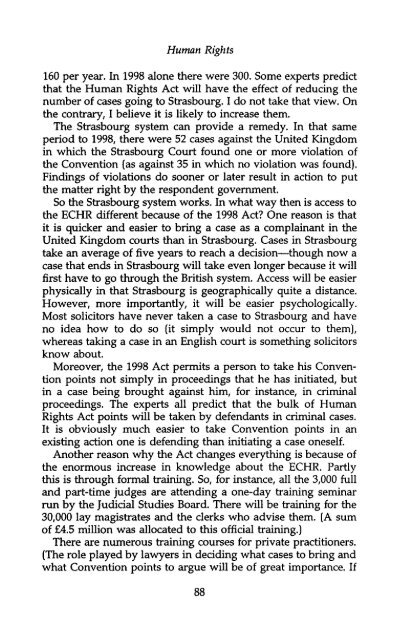HAMLYN - College of Social Sciences and International Studies ...
HAMLYN - College of Social Sciences and International Studies ...
HAMLYN - College of Social Sciences and International Studies ...
Create successful ePaper yourself
Turn your PDF publications into a flip-book with our unique Google optimized e-Paper software.
Human Rights<br />
160 per year. In 1998 alone there were 300. Some experts predict<br />
that the Human Rights Act will have the effect <strong>of</strong> reducing the<br />
number <strong>of</strong> cases going to Strasbourg. I do not take that view. On<br />
the contrary, I believe it is likely to increase them.<br />
The Strasbourg system can provide a remedy. In that same<br />
period to 1998, there were 52 cases against the United Kingdom<br />
in which the Strasbourg Court found one or more violation <strong>of</strong><br />
the Convention (as against 35 in which no violation was found).<br />
Findings <strong>of</strong> violations do sooner or later result in action to put<br />
the matter right by the respondent government.<br />
So the Strasbourg system works. In what way then is access to<br />
the ECHR different because <strong>of</strong> the 1998 Act? One reason is that<br />
it is quicker <strong>and</strong> easier to bring a case as a complainant in the<br />
United Kingdom courts than in Strasbourg. Cases in Strasbourg<br />
take an average <strong>of</strong> five years to reach a decision—though now a<br />
case that ends in Strasbourg will take even longer because it will<br />
first have to go through the British system. Access will be easier<br />
physically in that Strasbourg is geographically quite a distance.<br />
However, more importantly, it will be easier psychologically.<br />
Most solicitors have never taken a case to Strasbourg <strong>and</strong> have<br />
no idea how to do so (it simply would not occur to them),<br />
whereas taking a case in an English court is something solicitors<br />
know about.<br />
Moreover, the 1998 Act permits a person to take his Convention<br />
points not simply in proceedings that he has initiated, but<br />
in a case being brought against him, for instance, in criminal<br />
proceedings. The experts all predict that the bulk <strong>of</strong> Human<br />
Rights Act points will be taken by defendants in criminal cases.<br />
It is obviously much easier to take Convention points in an<br />
existing action one is defending than initiating a case oneself.<br />
Another reason why the Act changes everything is because <strong>of</strong><br />
the enormous increase in knowledge about the ECHR. Partly<br />
this is through formal training. So, for instance, all the 3,000 full<br />
<strong>and</strong> part-time judges are attending a one-day training seminar<br />
run by the Judicial <strong>Studies</strong> Board. There will be training for the<br />
30,000 lay magistrates <strong>and</strong> the clerks who advise them. (A sum<br />
<strong>of</strong> £4.5 million was allocated to this <strong>of</strong>ficial training.)<br />
There are numerous training courses for private practitioners.<br />
(The role played by lawyers in deciding what cases to bring <strong>and</strong><br />
what Convention points to argue will be <strong>of</strong> great importance. If<br />
88

















